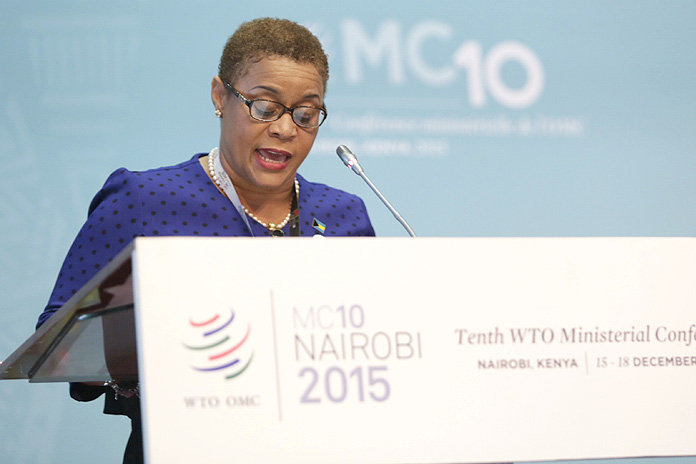Minister at WTO Conference..

The Minister of Financial Services and Local Government, the Hon. C.V. Hope Strachan, led a local delegation to represent The Bahamas at the 10th Ministerial Conference of the World Trade Organization (WTO), which was held in Nairobi Kenya from the 15th to the 19th of December, 2015. It marked the first time that the Conference was hosted by an African nation and the twentieth anniversary since the establishment of the WTO. The Ministerial Conference, which is comprised of Trade Ministers from all WTO Member States, is the highest decision-making body of the WTO and usually meets every two years.
The Conference was opened on the 15th of December, 2015, by President Uhuru Kenyatta of Kenya, while Amina Mohamed, the Cabinet Secretary for Foreign Affairs and International Trade of Kenya, served as Chairman of the Conference. Opening day addresses were also given by the Director-General of the WTO, Roberto Azevêdo and the Chair of the General Council of the WTO, Ambassador Fernando de Mateo of Mexico.
The Plenary Session, which began on 16th December, 2015, gave international Trade Ministers and Heads of Delegations an opportunity to make prepared statements on trade issues which they desired to be addressed or resolved by the WTO. The first Plenary Session was followed by a special ceremony to formally accept the Republic of Liberia as a member of the WTO. Liberia became the thirty-fifth Least Developed Country (LDC) of the WTO and the eighth LDC to become a member of the WTO since 1995. Liberia’s President, H.E. Ellen Johnson Sirleaf, was on-hand to accept membership on behalf of Liberia. On the 17th, a special session was also held for the acceptance of the Islamic Republic of Afghanistan as a member of the WTO.
Afghanistan became the thirty-sixth LDC to become a member of the WTO, and the ninth LDC to become a member since the WTO was established in 1995.
The Bahamas submitted its application to join the WTO in 2001 and is currently in the process of negotiating the terms of its membership, a process which all new countries joining the WTO must undergo. Although only an Observer Member of the WTO, The Bahamas was able to address the Conference on the 18th of December.
Minister Strachan, in her capacity as the Minister responsible for international trade, used the occasion to update the international community on The Bahamas’ progress in becoming a member of the organization. She noted that The Bahamas has made significant strides in its accession process and remains fully committed to joining the WTO. Minister Strachan emphasized that access to foreign markets and attracting foreign direct investment is crucial to the economic well-being of The Bahamas and that membership in the WTO brings the stability and predictability conducive for trade and investment. She further noted that remaining on the fringes of the WTO system is “no longer a viable option for The Bahamas.”
Minister Strachan told the Plenary Session that the Government of The Bahamas is mindful of both the vulnerabilities of the Bahamian economy and the benefits of WTO membership. She pointed out however, that the process of accession and negotiating to become a member of the WTO remains challenging for The Bahamas given the country’s limited capacity and resources.
“As a small developing archipelago, The Bahamas faces peculiar developmental and economic challenges, including the replication of infrastructure on twenty two inhabited islands, regardless of size or population. Consequently, The Bahamas is largely excluded from eligibility for certain international loans and grants, because of what is perceived as the country’s relatively high per capita income, which ignores practical realties of archipelagos like The Bahamas and does not truly reflect the peculiarities of the income structure of the country.”
She appealed to those in attendance that, in negotiating its membership to the WTO, The Bahamas should not be required to make concessions that would constrain the country’s development or require it to make commitments beyond those undertaken by similar countries in the Caribbean.
During the Conference, many speakers who addressed the Plenary Sessions took the opportunity to highlight the United Nation’s 2030 Agenda on Sustainable Development and the results of the recent United Nations Framework Convention on Climate Change Conference in Paris as evidence that the international community could provide solutions for pressing issues, and that such achievements should be a source of hope and encouragement that the WTO membership can achieve positive outcomes. In that regard, Minister Strachan also noted that The Bahamas believes that “the WTO can play a meaningful role in achieving the goals of the United Nations 2030 Agenda for Sustainable Development”.
It was anticipated that the 10th Ministerial Conference of the WTO would also serve as a platform for advancing negotiations on developmental issues that have been on the negotiating table for the past 14 years, including progress on the Doha Development Agenda (DDA), the latest round of trade negotiations among the WTO members. The question as to whether the WTO members should conclude the Doha Development Agenda has been a contentious issue for members of the WTO. Like many speakers from developing member states of the WTO, Minister Strachan called for a successful conclusion to the Doha Development Agenda.
Minister Strachan has noted that “The Bahamas, like other developing countries, has been pressing for a continuation of the Doha Development Round of negotiations and compromises in order to come to a mutually agreeable conclusion for all countries and trade partners involved (in favor of increased global trade). Many Developed members are of the view that in the 14 years of negotiations on the DDA, the negotiations have not produced any substantial outcomes, necessitating a move in a new direction, and to use new and creative methods of negotiation in order to address the broken negotiating function of the WTO. However, our view is that we must continue to explore opportunities through the established means to make meaningful progress sooner rather than later.”
The lack of progress on the DDA, which encompasses many issues that are sensitive to both developed and developing countries like The Bahamas, is due primarily to the impasse between developed and developing countries on special and differential treatment provisions across different WTO agreements. Special and differential treatment provisions provide special flexibilities or rights to developing countries to enable them to take full advantage of trade liberalization and integrate more fully into the multilateral trading system.
One of the principal reasons for the stagnation of the DDA has been due to emerging economies (such as China, Brazil and India) which seek the maximum flexibilities under the WTO. In contrast, many developed countries feel that they would be burdened with significant tariff cuts while their counterparts would have more relaxed tariff cuts and greater implementation time. This divergence is compounded by the fact that the WTO Agreements do not contain a definition of “developing country” as the system is based on self-election, and some emerging economies, China in particular, have insisted on its categorization as a developing country despite the objection of other members.
At the conclusion of MC10 , it was acknowledged that members of the WTO “have different views” on how to address the future of the Doha Development Agenda as some reaffirm the Doha mandates and others believe new approaches are necessary to achieve meaningful outcomes in multilateral negotiations. In the end, Member States agreed “to advance negotiations on the remaining Doha issues.”
During MC10 Member States of the WTO also hoped to arrive at a consensus on sensitive agricultural issues. In particular, developing countries hoped that developed countries like the United States and the European Union, would agree to eliminate government subsidies on agricultural exports on the basis that such subsidies make it impossible for agricultural products from developing countries to compete on the global market. African countries had high hopes that such a result could be achieved given the symbolic importance of the Conference being hosted for the first time on the African continent. In the end, Member States were able to arrive at an agreement on the elimination of agricultural export subsidies, which was praised as a significant achievement for the WTO as it marked the first substantial decision to be made on agriculture since the Doha Development Agenda was launched in 2001.
In the Nairobi Ministerial Declaration adopted by the Conference on the final day, Member States reaffirmed the pre-eminence of the WTO as the global forum for trade rules setting and governance and acknowledged the contribution that the rules-based multilateral trading system has made to the strength and stability of the global economy. While acknowledging with concern the slow and uneven recovery from the severe economic and financial crisis of 2008, which resulted in lower global economic growth, depressed agricultural and other commodity prices, raising inequalities, unemployment and significantly slower expansion of international trade in recent years, they also acknowledged that international trade can play a role towards achieving sustainable, robust and balanced growth for all and has a major role in the promotion of economic development and the alleviation of poverty. In addition, they acknowledged that the WTO’s trade monitoring work, including its trade policy reviews, has contributed consistently to the functioning of the multilateral trading system, by achieving greater transparency in, and understanding of, the trade policies and practices of Members.
Of particular relevance to small vulnerable economies like The Bahamas, Member States reaffirmed their commitment to continue to address (in every area of WTO work), in a substantive and meaningful manner, the needs of small, vulnerable economies (SVEs) and to favourably consider the adoption of measures which would facilitate their fuller integration into the multilateral trading system. Member States also agreed to take into account the needs of this group of countries in all areas of negotiations and instructed the WTO Secretariat to continue its work on the challenges and opportunities experienced by small economies when linking into global value chains.
WTO Members also agreed to a number of other important measures relevant to Least-Developed Countries (LDCs), the poorest Members of the WTO which remain vulnerable and continue to face structural difficulties in the global economy. These include decisions by WTO Member States to (i) permit developing members to impose tariffs on imported agricultural products to protect the local agricultural industry in certain circumstances, (ii) to negotiate and arrive at an agreement on government food security programmes, (iii) to provide special concessions to cotton imported from cotton-producing LDCs, and (iv) to provide preferential treatment for products and services made in or supplied by LDCs. The WTO praised this package of decisions as “historic”, as they will ultimately benefit the poorest Member States of the WTO.







